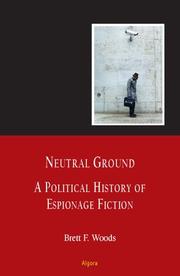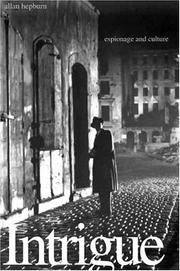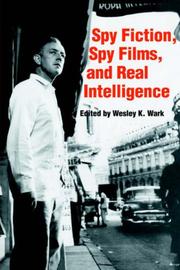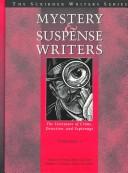| Listing 1 - 6 of 6 |
Sort by
|

ISBN: 1281398365 9786611398361 0875865356 9780875865355 9780875865331 087586533X 9780875865348 0875865348 9781281398369 Year: 2008 Publisher: New York Algora Pub.
Abstract | Keywords | Export | Availability | Bookmark
 Loading...
Loading...Choose an application
- Reference Manager
- EndNote
- RefWorks (Direct export to RefWorks)
This unique and perceptive history unravels geopolitical intrigues and reveals how they have influenced the authors who fashioned one of the most popular forms of entertainment in the literate world the spy novel. Espionage fiction is one of the most popular forms of entertainment in the literate world and, since its widespread acceptance in the early twentieth century, it has sought to pursue the secret politics of Western social order. Drawn from reality, exposing what is generally concealed, it provides a unique glimpse into the darker, more conspiratorial affairs of state through the use of fictional covert actions, double agents, treason, and international intrigues. It is a carefully crafted, clandestine venue wherein the situations are circumscribed, the moods are forever gray, and the heroes if indeed there are heroes generally emerge as ordinary individuals who believe that virtues such as truth and loyalty are simply matters of convenience. People who are, in fact, not that much different from those whom they oppose. The concept of neutral ground the term adapted from Sir Walter Scott s early nineteenth century Waverly novels originally spoke to the geographic region between two warring armies, a place controlled by neither but marked by fluid jurisdictions drawn by the ebb and flow of strategic influences or battle lines. But with the passage of time, and the refinement of espionage fiction, the definition of neutral ground witnessed a transition, emerging as both metaphor and cautionary note for the thematic conflicts and doubts that flourish in the absence of clear political authority. An intellectual nether region reminiscent perhaps of Cold War Berlin that affords conflicting parties unrestricted rights of passage and where political ideology and literary fiction can and do seamlessly intersect. Yet, in the grander historical sense, the evolution of espionage fiction also reflects the history of a culture for, as the genre evolved, so too did Western society. To explore these historical relationships Neutral Ground: A Political History of Espionage Fiction takes the reader behind the fiction and explores the real-world political, military, and diplomatic events that have consistently and significantly threaded their way through the fabric of the genre. Against this historical timeline, it examines how numerous authors including Rudyard Kipling, Somerset Maugham, Graham Greene, and John le Carré have engaged reality in order to write the espionage novels that have become literary classics and, in selected cases, have also served to alter the course of government policy.
Spy stories, English --- Spy stories, American --- Politics and literature --- World politics in literature. --- Espionage in literature. --- Spies in literature. --- American spy stories --- American fiction --- History and criticism. --- History --- Espionage in literature --- Spies in literature --- World politics in literature --- History and criticism

ISBN: 1282437526 9786612437526 0300148488 9780300148480 9780300104981 0300104987 0300104987 9781282437524 Year: 2005 Publisher: New Haven
Abstract | Keywords | Export | Availability | Bookmark
 Loading...
Loading...Choose an application
- Reference Manager
- EndNote
- RefWorks (Direct export to RefWorks)
Why do spies have such cachet in the twentieth century? Why do they keep reinventing themselves? What do they mean in a political process? This book examines the tradition of the spy narrative from its inception in the late nineteenth century through the present day. Ranging from John le Carré's bestsellers to Elizabeth Bowen's novels, from James Bond to John Banville's contemporary narratives, Allan Hepburn sets the historical contexts of these fictions: the Cambridge spy ring; the Profumo Affair; the witch-hunts against gay men in the civil service and diplomatic corps in the 1950s.Instead of focusing on the formulaic nature of the genre, Intrigue emphasizes the responsiveness of spy stories to particular historical contingencies. Hepburn begins by offering a systematic theory of the conventions and attractions of espionage fiction and then examines the British and Irish tradition of spy novels. A final section considers the particular form that American spy narratives have taken as they have cross-fertilized with the tradition of American romance in works such as Joan Didion's Democracy and John Barth's Sabbatical.
Spy stories, English --- American fiction --- English fiction --- Spy stories, American --- Espionage, American --- Espionage, British --- Spy films --- Espionage in literature. --- Spies in literature. --- Cloak and dagger films --- Espionage films --- Secret agent films --- Secret service films --- Motion pictures --- British espionage --- American spy stories --- History and criticism. --- History
Book
ISBN: 0292723008 029278466X Year: 2010 Publisher: University of Texas Press
Abstract | Keywords | Export | Availability | Bookmark
 Loading...
Loading...Choose an application
- Reference Manager
- EndNote
- RefWorks (Direct export to RefWorks)
Illuminating a powerful intersection between popular culture and global politics, Spies and Holy Wars draws on a sampling of more than eight hundred British and American thrillers that are propelled by the theme of jihad—an Islamic holy war or crusade against the West. Published over the past century, the books in this expansive study encompass spy novels and crime fiction, illustrating new connections between these genres and Western imperialism. Demonstrating the social implications of the popularity of such books, Reeva Spector Simon covers how the Middle Eastern villain evolved from being the malleable victim before World War II to the international, techno-savvy figure in today's crime novels. She explores the impact of James Bond, pulp fiction, and comic books and also analyzes the ways in which world events shaped the genre, particularly in recent years. Worldwide terrorism and economic domination prevail as the most common sources of narrative tension in these works, while military "tech novels" restored the prestige of the American hero in the wake of post-Vietnam skepticism. Moving beyond stereotypes, Simon examines the relationships between publishing trends, political trends, and popular culture at large—giving voice to the previously unexamined truths that emerge from these provocative page-turners.
English fiction --- American fiction --- Spy stories, English --- Spy stories, American --- Detective and mystery stories, English --- Detective and mystery stories, American --- Jihad in literature. --- Espionage in literature. --- Spies in literature. --- Politics and literature --- History and criticism. --- History --- Middle East --- In literature. --- American spy stories --- Asia, South West --- Asia, Southwest --- Asia, West --- Asia, Western --- East (Middle East) --- Eastern Mediterranean --- Fertile Crescent --- Levant --- Mediterranean Region, Eastern --- Mideast --- Near East --- Northern Tier (Middle East) --- South West Asia --- Southwest Asia --- West Asia --- Western Asia --- Orient

ISBN: 0714634115 9780714634111 Year: 1991 Publisher: London: Routledge,
Abstract | Keywords | Export | Availability | Bookmark
 Loading...
Loading...Choose an application
- Reference Manager
- EndNote
- RefWorks (Direct export to RefWorks)
Intelligence service --- Intelligence service in literature --- Spy films --- Spy stories, American --- -Spy stories, English --- -327.8.019.5 --- English spy stories --- English fiction --- American spy stories --- American fiction --- Cloak and dagger films --- Espionage films --- Secret agent films --- Secret service films --- Motion pictures --- Counter intelligence --- Counterespionage --- Counterintelligence --- Intelligence community --- Secret police (Intelligence service) --- Public administration --- Research --- Disinformation --- Secret service --- History and criticism. --- History and criticism --- Spy stories, English --- Espionage in literature --- Spies in literature --- 327.8.019.5 --- English fiction - 20th century - History and criticism --- Spy stories, English - History and criticism
Book
ISBN: 9780801451232 9780801478536 9780801465475 0801465478 9780801465918 0801465915 080145123X 0801478537 1322504148 9781322504148 Year: 2012 Publisher: Ithaca
Abstract | Keywords | Export | Availability | Bookmark
 Loading...
Loading...Choose an application
- Reference Manager
- EndNote
- RefWorks (Direct export to RefWorks)
In December 2010 the U.S. Embassy in Kabul acknowledged that it was providing major funding for thirteen episodes of Eagle Four-a new Afghani television melodrama based loosely on the blockbuster U.S. series 24. According to an embassy spokesperson, Eagle Four was part of a strategy aimed at transforming public suspicion of security forces into something like awed respect. Why would a wartime government spend valuable resources on a melodrama of covert operations? The answer, according to Timothy Melley, is not simply that fiction has real political effects but that, since the Cold War, fiction has become integral to the growth of national security as a concept and a transformation of democracy. In The Covert Sphere, Melley links this cultural shift to the birth of the national security state in 1947. As the United States developed a vast infrastructure of clandestine organizations, it shielded policy from the public sphere and gave rise to a new cultural imaginary, "the covert sphere." One of the surprising consequences of state secrecy is that citizens must rely substantially on fiction to "know," or imagine, their nation's foreign policy. The potent combination of institutional secrecy and public fascination with the secret work of the state was instrumental in fostering the culture of suspicion and uncertainty that has plagued American society ever since-and, Melley argues, that would eventually find its fullest expression in postmodernism. The Covert Sphere traces these consequences from the Korean War through the War on Terror, examining how a regime of psychological operations and covert action has made the conflation of reality and fiction a central feature of both U.S. foreign policy and American culture. Melley interweaves Cold War history with political theory and original readings of films, television dramas, and popular entertainments-from The Manchurian Candidate through 24-as well as influential writing by Margaret Atwood, Robert Coover, Don DeLillo, Joan Didion, E. L. Doctorow, Michael Herr, Denis Johnson, Norman Mailer, Tim O'Brien, and many others.
American fiction --- Espionage in literature --- Literature and history --- National security --- Popular culture --- Secrecy in literature --- Spy stories, American --- Terrorism in literature --- World politics in literature --- Culture, Popular --- Mass culture --- Pop culture --- Popular arts --- Communication --- Intellectual life --- Mass society --- Recreation --- Culture --- American spy stories --- National security policy --- NSP (National security policy) --- Security policy, National --- Economic policy --- International relations --- Military policy --- History and criticism --- Social aspects --- Political aspects --- History --- Government policy --- World politics in literature. --- Secrecy in literature. --- Terrorism in literature. --- Espionage in literature. --- History and criticism.

ISBN: 0684804921 0684804913 0684806207 0684806444 0684806630 0684312921 0684805197 0684805200 0684316617 0684315793 0684315807 0684315815 0684315823 0684315831 9780684804927 9780684805207 9780684805191 9780684315782 Year: 1998 Publisher: New York: Scribner,
Abstract | Keywords | Export | Availability | Bookmark
 Loading...
Loading...Choose an application
- Reference Manager
- EndNote
- RefWorks (Direct export to RefWorks)
Presents biographical and critical essays covering influential writers of mystery, detective, police, and spy novels.
Detective and mystery stories, English --- Detective and mystery stories, American --- Spy stories, American --- Spy stories, English --- Crime in literature --- Dictionaries. --- Bio-bibliography --- 929 <73> --- Biografie. Genealogie. Heraldiek--Verenigde Staten van Amerika. VSA. USA --- United States --- Biography --- -Dictionaries. --- 929 <73> Biografie. Genealogie. Heraldiek--Verenigde Staten van Amerika. VSA. USA --- Espionage in literature --- Spies in literature --- English spy stories --- English fiction --- American spy stories --- American fiction --- English detective stories --- English mystery stories --- American detective stories --- American mystery stories --- Crime stories, American --- Dictionaries --- Bio-bibliography&delete& --- Detective and mystery stories, English - Dictionaries. --- Detective and mystery stories, English - Bio-bibliography - Dictionaries. --- Detective and mystery stories, American - Bio-bibliography - Dictionaries. --- Detective and mystery stories, American - Dictionaries. --- Spy stories, American - Bio-bibliography - Dictionaries. --- Spy stories, English - Bio-bibliography - Dictionaries. --- Spy stories, American - Dictionaries. --- Spy stories, English - Dictionaries. --- Crime in literature - Dictionaries.
| Listing 1 - 6 of 6 |
Sort by
|

 Search
Search Feedback
Feedback About UniCat
About UniCat  Help
Help News
News